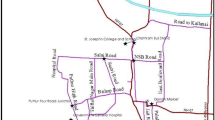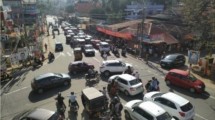Abstract
The present study is attempted to explore and evaluate the feasibility of modeling technique for the prediction of congestion indices under heterogeneous traffic conditions at Bhubaneswar city near Patia region. Congestion prediction is attempted under heterogeneous traffic conditions in order to determine their feasibility under the Indian traffic scenario and proposes suggestions of implementing congestion solutions. Two urban road stretches of Patia region of Bhubaneswar city was considered as study area. Survey was conducted for morning peak hours considered from 8:00 a.m. to 11:00 a.m. by video graphic survey. Similarly, survey was conducted for evening peak hours considered from 5:00 p.m. to 7:00 p.m. By synchronizing videos, traffic volume and travel time was obtained which were required for the measure of congestion indices. The average travel time was calculated. Buffer time index, travel time index, and planning time index were estimated. Congestion indices for each direction and each road were evaluated from above parameters. Impact of lane discipline on different congestion indices is analyzed. Formulation of buffer index, travel time index, and planning time index are done to evaluate the various impacts on traffic conditions using nonlinear regression modeling. Average travel time and 95th percentile travel time of different category of vehicles were calculated for each section of road network system for the direction of traffic without considering the lane behavior. Effect of lane discipline on congestion indices of road system was studied. The prime focus of the study relies on congestion indices in terms of travel time reliability measures to find the operational efficiency of urban road network in Bhubaneswar city.
Access this chapter
Tax calculation will be finalised at checkout
Purchases are for personal use only
Similar content being viewed by others
References
De Palma A, Lindsey R (2011) Traffic congestion pricing methodologies and technologies. Transp Res Part C Emerg Technol 19(6):1377–1399
Mauray AK (2011) Comprehensive approach for modeling of traffic stream with no lane discipline. In: 2nd international conference on models and technologies for intelligent transportation system, Leuven, Belgium, 2011, pp 1–5
Padiath A, Vanajakshi L, Subramanian SC, Manda H (2009) Prediction of traffic density for congestion analysis under Indian traffic conditions. In: 12th international IEEE conference on IEEE intelligent transportation systems, ITSC’09, pp 1–6
Bigazzi, AY (2011) Traffic congestion mitigation as on emission reduction strategy, M.S Thesis in Civil Engineering Department, Portland State University
Chidambaram B, Zikos D (2012) Congestion mitigation measure in Hyderabad, A Midnight summer dream, South Asia chronicle. Sudasien Seminar Humboldt University, Berlin, pp 58–92
Tiwari G, Fazio J, Gaurav S (2007) Traffic planning for non homogeneous traffic. Sadhana 32(4):309–328
IRC SP-30 (2010) Manual on economic evaluation of highway projects in India. Indian Road Congress, New Delhi
Kobayashi K, Do M (2005) The informational impact of congestion tolls upon route traffic demand. J Transp Res Part A 39:651–670
Lyman K, Bertini RL (2008) Using travel time reliability measures to improve regional transportation planning and operation. J Transp Res Board 2046:1–10
Mahmud K, Chowdhury K, Gopeand SM (2012) Possible causes & solutions of traffic jam and their impact on the economy of Dhaka City. J Manage Sustain 2(2):112–135
Author information
Authors and Affiliations
Corresponding author
Editor information
Editors and Affiliations
Rights and permissions
Copyright information
© 2020 Springer Nature Singapore Pte Ltd.
About this paper
Cite this paper
Samal, S.R., Das, A.K. (2020). Evaluation of Traffic Congestion Parameters Under Heterogeneous Traffic Condition: A Case Study on Bhubaneswar City. In: Mathew, T., Joshi, G., Velaga, N., Arkatkar, S. (eds) Transportation Research . Lecture Notes in Civil Engineering, vol 45. Springer, Singapore. https://doi.org/10.1007/978-981-32-9042-6_53
Download citation
DOI: https://doi.org/10.1007/978-981-32-9042-6_53
Published:
Publisher Name: Springer, Singapore
Print ISBN: 978-981-32-9041-9
Online ISBN: 978-981-32-9042-6
eBook Packages: EngineeringEngineering (R0)




